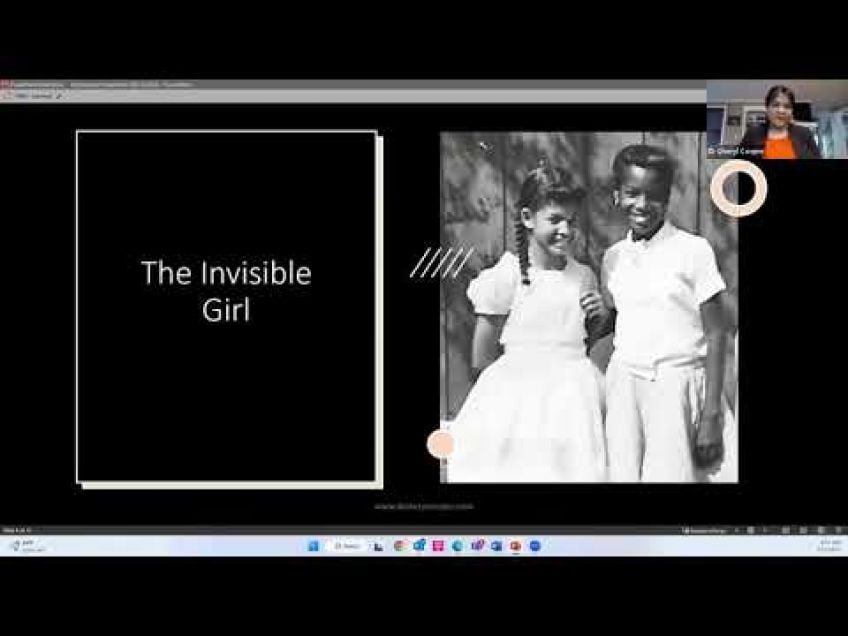5 Steps to Stop Your Inner Critic Taking the Power Over You
Mastering Your Inner Critic for Personal and Professional Growth
Feeling held back by your inner critic? It’s a voice all too familiar to us, whispering doubts and fear, stunting our growth and potential. However, in this riveting session, we're going to explore how to constructively work alongside our inner critic, helping us achieve our dreams and ambitions.
Who Am I?
As a mom, wife, assistant engineer, and now the head of the audio delivery unit at Proceven, plus the host of “I am Antuana” podcast – I've worn many hats. Despite juggling these roles simultaneously, I've navigated a demanding career that spans over 20 years. My work – a blend of multiple industries and varied cultural settings – inspired me to create the Career Confidence Coach business for immigrant women. This venture aimed at aiding women who, like myself, had felt stuck at a certain point in their careers.
The Reality of Your Inner Critic
Let’s face it, negative self-talk can be detrimental. Constant doubts and fears can sabotage our progress professionally and personally. So, you'll be disappointed to hear – there's simply no way to eliminate your inner critic completely. However, what if we could reframe our viewpoint and see our inner critic as an ally, and not an enemy?
Your inner critic is simply trying to guard you - to shield you from criticism, rejection, questioning, or any form of deviation from your comfort zone. Once you begin to see it as a protective entity rather than an adversary, the narrative changes and the hold your inner critic has on you diminishes.
Five Steps to Co-existing With Your Inner Critic
After years of dealing with my inner critic, I’ve established an effective five-step process to better understand it and leverage it for personal and professional advancement.
- Acknowledge Them: Recognize your inner critic's presence. Be aware.
- Separate Yourself: Create a character for your inner critic. Understanding that you are not this critical voice is crucial in approaching your interactions with it objectively.
- Ask Questions: Interrogate your inner critic to understand their concerns. This includes using the 5 Why's technique to get to the bottom of their fears.
- Reframe Their Advice: As you gain clarity on your inner critic's worries, reframe their concerns in a positive, fact-based manner. Pairing small positive changes with constructive feedback ensures a productive dialogue with your inner critic.
- Consistency: Make a conscious effort to repeat these steps. Constant interaction with your inner critic will help minimize the analysis paralysis caused by it.
These steps help me reframe how I perceive my inner critic – as an ally rather than an opponent – a helpful tool in my professional and personal advancement.
In conclusion, reframing your relationship with your inner critic helps advance personal and professional growth. Remember, perfection is a myth, and every step toward your goal is a milestone worth celebrating. Let's silence the echoes of our inner critic and amplify our success stories!
Contact Me
Interested to learn more? Book a complimentary call with me or connect via LinkedIn. Whether you're looking for professional advice or striving to be an excellent guest on my podcast, I’d love to hear from you!
Video Transcription
Okay. Well, welcome everybody to this, workshop about the inner critic. And it's something that I'm super super passionate about it, because it's something that is living with us.Oh, is people listening? Can you hear me? Yeah? Okay. Cool. Okay. Cool. Thank you. Oh, thank you. Thank you. Thank you. Right. So, yes, so we I have a pack 20 minutes that I want to share with you about the inner critic, and the inner critic is that leader voice that we have constantly talking to us and sometimes they're stopping us to go into the next big thing, do the big thing, and move us forward.
Right? But let's have a talk a little bit about, just give me a second. There you go. So but first, Let me tell you a little bit about who I am. I'm the mom of Ethan and Grace and a wife of a Steve. I just have one one husband. I'm a assistant engineer. And now currently working at the head of the audio delivery unit for, these are platforms in Proceven, which is a German company, but I'm all the way in the UK, so I work, remote. Also the podcaster for a pod a podcast called I am Antuana, which is orientated to immigrant women's. I found myself talking with so many of my friends, of so many different subjects that I thought that I needed to share that knowledge and that wisdom that all these women have to the world.
And this is how 3, 4 years ago, I am Antuana pop up, and now we are it is on 4. That also took me to develop my career confidence coach business for immigrant woman because I found that we were facing a lot of things together, and we were feeling sometimes the stock at certain levels of our career, and I really wanted to help all of these women's, to get to the place that they deserve.
I have more than 20 years of, experience I live in 4 different countries and work with different, industries and, travel the world training people from different cultures, different nationalities, and cultures. So you can imagine how many times a little boy's having in my head, so many times. And that is why I'm really passionate about this subject that we're going to talk today. So I'm just wondering And as far as I remember, these were some of the thoughts that I was constantly having in my head since I was little. And these stores were even worse by the time I left university as a system engineer because I have to show my value And what I knew in an industry where at that time we were very few and still we are very few, but these even became stronger when I moved to my, from my home country Venezuela to the UK.
And these thoughts and and doubts work constantly sabotaging my progress in my profession until one day. And after lots and lots of self development, I realized that these stores weren't going weren't going to leave me anytime soon, and they were going to stay with me for the rest of my life. And they say is the bad news for you. The inner critic will never never leave you. So you might be thinking. Hold on a minute. I came here to listen how to get rid of it, and now she's telling me that this will be with me for the rest of my life, well, I want to challenge the way that you see your inner critic. And I know you are constantly battling with it every single day with battling with it. And I know this, I know that probably is stopping you for raising your hand in meetings, for putting yourself into big presentations, to propose that idea that you're having in mind that you know it works.
So what about you see your inner critic as your ally and not your enemy. So what if I tell you that your inner critic is your best friend and not your enemy? Bear with me. Your inner critic is the guardian of your comfort zone. So imagine that you are in the circle cool comfort zone And every time you're trying something different, something adventurous, or unusual that is taking off of you, so enough comfort, this little guardian remind you that you will be in danger of being rejected, being on love, being criticized, being questioned, been dynamic.
So when you change the paradigm of seeing it as your enemy, and something that you need to get rid of all the time because it's stressing you. What about you treating you're in a critic with this kind, like this kind of supportive entity that is protecting you. So the moment that you change that for, the narrative change. And the power that these have in you also change. So for anyone that have kids here and if you have it, if you don't have kids, imagine, if you have your kids in the supermarket and suddenly your kids start crying like crazy in the middle of a of an aisle, you're not going to shower them. You might, but usually you don't. Right? So you shower them, you're not shouting, and then you go down to the level that they are and ask them, what's going on? Is that something wrong?
Did you hurt yourself? Do you have a pain? Something someone did something to you. So you literally go and treat that person that lead a child with kinase, you hog them, etcetera. So I constantly experience this dialogue with my inner critic. And, actually, I have a conversation all this morning before jumping into this presentation. So what I do is using these five steps that enable me to move in myself forward despite of anything that my inner critic might be telling you or telling me, actually. So let's dig into that. So what is the The first step is knowing your inner critique. That is super important. So awareness. So the first thing that you need to know is having that awareness. And the moment that I you acknowledge it, And you say, hey. That's interesting.
And here are my inner voice right now. That is crucial. And it's the first very most important step is that The second step, and you might be laughing about it, but it's a really good practice, is create a character from it. Mine is called Barbara. And the idea here is that you describe who is your inner critic that you have a clear understanding who is your university. It's a female or male? How old it is? Is that someone that reminds you a teacher or a auntie or an uncle How is her her boy sounds like? Mine, as you can see, is, like, perfect posed person that the hair is never out of place. Have these big glasses and every time that I'm trying to do something like this presentation, she look at me and she say to me, like, really?
Do you think you can do that? So that is why this is mine. Why? Because it's very important that you are able to separate yourself from that inner critic and how to do that being an active listener. Now what is an active listener? He's been pressing during the conversation. He's listening without judging on jumping to conclusions and without a star planning what you're going to say. So these my sense is strange to you right now by stopping and actually listen to your inner critic. But that will help you massively when we go to the second step. So step number 2 is separate yourself from it. So liberating yourself from the influence of the inner critics depends on a very simple insight. You are not the critical voice.
You are the person aware of the critical voice. You are the entity that is hearing the voice. The critic is not the core of you, and that is super important. The core of you is the you of your aspirations, of you in a Western, the critic is a kind of a intruder in a way. So it's a voice that happens to play in your mind, but it's not who you really are. So separating the eye from the inner critic, and this is what is so important to have this character, will help you. So let's start with taking away the I from the sentence. So in a state in a state of using in something like, oh, I'm so useless right now.
You might say my inner critic or Barbara, is feeling useless right now. Then see the conversation like a third person mode. Like, you are serving the chat from the outside. So imagine that you are in a coffee shop and then you have yourself and you're in a critic talking and you are looking outside like your referee. And this will take you and to preparing yourself for the most intricate part of the process, which is a step number 3, ask the questions. So And I have an onion here. So onions are made of so many so many layers that sometimes you need to feel to get the luke cooking good looking onion to start chopping it. Right?
So but by chopping the onion, you could cause a little bit of inconvenience. And this is what I'm saying that is a be a very more difficult process because you will need to go deeper, and that might cost you a little bit of, feeling a little bit uncomfortable, but it's very, very important. Why? Because area here is trying to understand what your inner critic is doing right now. What harm is trying to protect yourself from? What is what? This in the career that he's afraid of. So you will find different layers of the simple statement that you're incorrectly telling you, that you will need to peel and find the actual issue. And that is where I go to the phi ys. And probably a lot of you have been listening about these phi y techniques.
And it's one of the best techniques to find out the root cause. So by asking yourself five times about it, you can get to the bottom of the issue rather than that spending time trying to resolve something that actually is not a problem. For example, if you're in a critic saying, oh, you're not good enough for this. So as you're in a critic, why? You know, because you don't have all certifications to do this, and you know that. Right. But why the certifications, why do you think the certifications are important if I don't get it, I know you're not going to get it because you don't story enough for them, and you will always fail for them. But why you think that I will always fail? Oh, do you remember? Because your parents were very disappointed, but you, failed in your last year of university.
But why I feel bad about that? Because they wanted the same success that they have in their career and by failing there, you didn't have that same success in their eyes. So why for you being successful is important? Because I don't want to disappoint my parents. Boom. That is the point. So at this point is when you realize that it's not about the certification, really. Or the fact that you can pass on not a certification is about not disappointing people that is important to you. And that is the thing that you need to work on and resolve.
So, not feeling good enough about this project of this role maybe comes from don't want it to disappoint people. So usually these boys is trying to protect you from attack embarrassment, isolation, or failure that happened in the past. But do you know that doesn't happen all the time? You know that there has been cases before when that was okay. So every time that that happened and you identify, oh, that is the problem. That is the thing that I need to work on. So you can say to your inner critic, thank you for the advice, but I got this one cover. So how we do that? Going to step number 4. Three frame their advice that is telling you. So as you sell, is this true? Can you know without shadow of a doubt in a critic, the thesis through a 100% all the time.
And the majority of the times is going to say, actually, no. So there there is look for those, specific examples in the past when what the inner critic is telling you it hasn't happened. So when you have been successful, when you did that presentation and when when super well, so think about what will be the exact opposite to it, to think what is the opposite of it, but you need to feel those true. I truly believe in affirmations that I truly believe that they are really good, but they are really the affirmations of the be those belief need to be something that you really thing that is real because if you go from one stream to the other one, you mentally are not going to believe.
So even small changes like adding to that phrase, the jet at the end is super important. So let's say that you're inequity say, you are so useless. You're always running late. You're ruining things for yourself. You can respond. Hold in a minute. I am a busy person trying to fit a lot of things around. I am in demand, and I'm doing my best to make the deadline. So it's okay. And this can help you to take the power that that inner critic is having at that moment and, you know, putting in you. So another example is If you say something like, I am bad at doing presentation at work, you can refrain it. Like, I am not good at presentations yet. Or and learning how to do great presentation, and that is okay.
So by refraining, reframing, what you're in a critic is telling you to something that goes a little bit towards the positive side is going to massively massively help you. And the last one is repeat. When you start doing these steps, you will find your relationship winner critic begins to change. But no matter how initial amazing result you get, you need to repeat and repeat. The inequality is very smart and is able to evolve very quickly and start telling you things in a different way. So consistency is super super important, because that is the one that is going to allow you to diminish the effect that the inner critic has on you. And regardless what your mind, say, it will allow you to move forward in your career, in your personal life, and at the beginning, it might sounds a little bit like, oh my god.
I need to practice this. I need to kind of like stop. I need to think about it. But really and truly believe me that the more you do it, the more you're going to decrease that analysis paralysis that we have, And from month, not doing that project that you want to do or maybe that new project or new, I don't know, podcast that you want to do, from months to days to just minutes, you can really help, your inner critics to be in a better place and really treat it as it is is someone that want to protect you.
Now I know that this is easy to say and it's not that easy to kind of like implement it every day. So what I want to do for you is to give you this little in a critic, a daily journal, and it's something that I have that helps to a lot of my clients, at the beginning, to really identify when that inner critic is coming, what are the feelings I have in, what situation. So you can really, in a smart way, identify, what can you do? And once you put those thoughts of your adrenergic outside of your body and you really read it after 2, 3 weeks, you probably are going to say, oh, silly. I was thinking about that. Right? So you can scan the QR code and then you can get a free, daily journal that you can use. And I highly recommend it to use it for at least a couple of weeks. That is all for me. This is was very, very quick.
I hope that they help you with these fire steps that you can really start to implement it from from now. And if you want to get connected with me, there is all my links in every single social media But I'm looking for 5 immigrant women's that want to get their career, their confidence back, and move to the next level of their career. And if you just want to connect with me, book a complimentary, call with me, we can work together, and we can really dig and understand how can I help you? Thank you so much. And, yeah, see you later. Thank you. Thank you so much. Any questions? I think we have, like, one minute. Anyone have any questions? Oh, yeah. I can show that. Yes. I can show them. Why can I do that? Hold on. Let me just share the Let me how can I share it? Just give me a second. Oh, there you go. Thanks for you. Yes. Yeah. That was very quick. Sorry. Sorry. And, anyways, connect with me via at LinkedIn.
We can have a chat. We can see We can have a coffee together. And, definitely, we will like to connect with a lot of you, either for my coaching reasons or either for, my podcast. Love to have incredible, guesses also in my podcast. Thank you so much. Bye ladies.





